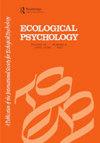经验对改变身体尺寸的障碍物下低爬行的承受能力的影响
IF 1.7
3区 心理学
Q3 PSYCHOLOGY, EXPERIMENTAL
引用次数: 3
摘要
摘要我们研究了经验在不同高度障碍下身体尺寸改变的低爬行的可供性感知中的作用。成年人决定五个背包中的哪一个(10-30 cm厚),它们将能够在障碍物下低爬行时穿着。参与者被分配到三种体验条件中的一种。选择前/选择后体验条件下的参与者在挑选背包前后都在障碍物下爬行,反馈条件下的与会者在挑选背包后都在障碍下爬行,但无体验条件下没有获得低爬行体验。过去的研究表明,在障碍物下低爬行的选择前体验会带来更准确的反应。总的来说,在所有三种情况下,参与者都将背包的高度缩放到障碍物的高度。选择前的低爬行体验强烈影响背包的选择,因此在选择前/选择后的条件下,参与者选择的背包要比其他条件下的参与者小得多,失败次数也更少。研究结果提供了证据,证明在不熟悉的姿势下进行短暂的练习可以改善可供性感知。本文章由计算机程序翻译,如有差异,请以英文原文为准。
Experience Influences Affordance Perception for Low Crawling Under Barriers With Altered Body Dimensions
Abstract We examined the role of experience in affordance perception for low crawling with altered body dimensions under barriers of different heights. Adults decided which of five backpacks (10–30 cm thick) they would be able to wear while low crawling under barriers. Participants were assigned to one of three experience conditions. Participants in the Pre/Post-choice experience condition crawled under the barrier before and after picking a backpack, participants in the Feedback condition crawled under the barrier after picking a backpack, but participants in the No Experience condition received no low-crawling experience. Past research suggests that pre-choice experience with low crawling under the barrier would lead to more accurate responses. Overall, participants in all three conditions scaled the height of the backpack to the barrier height. Pre-choice low-crawling experience strongly influenced backpack choices such that participants in the Pre/Post condition picked significantly smaller backpacks and produced fewer failures than participants in the other conditions. The results provide evidence that brief practice, in an unfamiliar posture, can lead to improvements in affordance perception.
求助全文
通过发布文献求助,成功后即可免费获取论文全文。
去求助
来源期刊

Ecological Psychology
PSYCHOLOGY, EXPERIMENTAL-
CiteScore
3.30
自引率
10.50%
发文量
8
期刊介绍:
This unique journal publishes original articles that contribute to the understanding of psychological and behavioral processes as they occur within the ecological constraints of animal-environment systems. It focuses on problems of perception, action, cognition, communication, learning, development, and evolution in all species, to the extent that those problems derive from a consideration of whole animal-environment systems, rather than animals or their environments in isolation from each other. Significant contributions may come from such diverse fields as human experimental psychology, developmental/social psychology, animal behavior, human factors, fine arts, communication, computer science, philosophy, physical education and therapy, speech and hearing, and vision research.
 求助内容:
求助内容: 应助结果提醒方式:
应助结果提醒方式:


